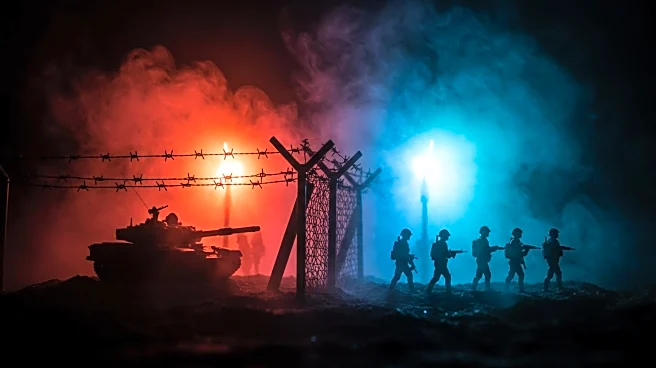What is the story about?
What's Happening?
South Korea fired warning shots at North Korean soldiers who briefly crossed the heavily fortified border earlier this week. The incident occurred in the Demilitarized Zone (DMZ) separating the two Koreas, prompting Seoul's military to respond with warning shots. The North Korean soldiers retreated north of the border following the shots. Pyongyang's state media accused South Korea of a 'premeditated and deliberate provocation,' claiming that Seoul's military used a machine gun to fire more than 10 warning shots. The event has heightened tensions between the two nations, with North Korea's military warning of potential retaliation if their efforts to seal the border are obstructed.
Why It's Important?
The incident underscores the fragile relations between North and South Korea, particularly as South Korea's new leader, Lee Jae Myung, seeks to improve ties with the North. Despite Lee's efforts to build 'military trust,' North Korea remains uninterested in dialogue, viewing joint military exercises between South Korea and the United States as provocative. The situation could impact regional stability and influence diplomatic relations, as North Korea continues to expand its nuclear capabilities. The escalation of tensions may affect international efforts to denuclearize the Korean Peninsula and could lead to increased military readiness in the region.
What's Next?
South Korea and the United States have commenced annual joint military exercises, which North Korea perceives as rehearsals for invasion. These exercises could further strain relations, as North Korea has historically reacted negatively to such drills. South Korea's leader, Lee Jae Myung, aims to reduce tensions and restore trust, but North Korea's recent actions suggest a challenging path ahead. The international community will likely monitor the situation closely, as any further military provocations could lead to broader geopolitical consequences.
Beyond the Headlines
The incident highlights the ongoing challenges in achieving peace and stability on the Korean Peninsula. North Korea's aggressive stance and South Korea's defensive measures reflect deep-seated mistrust and historical animosities. The situation raises ethical questions about military engagement and the potential human cost of escalating conflicts. Long-term, the event could influence regional security policies and impact diplomatic strategies aimed at reconciliation.

















